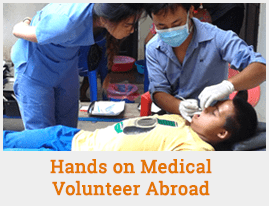VOLUNTEER IN COSTA RICA
' I LOVE this experience in chitwan for though short period! '
Xue Ying Fiona WangSea turtle conservation project (Caribbean Coast)
The Most Affordable
Volunteer fees starting at just
$175
The Most Reputed
Since 1998, over 18,000 Volunteers, hundreds of online reviews
The Most Transparent
No Middlemen. Pay your fees directly to host families and projects.
Project Summary
How does visiting pristine Costa Rican coast and living there temporarily to save sea turtles from extinction sound to you? For many of our volunteers it has been their dreams come true, a once in a life time opportunity. The project gives you a wonderful opportunity to save sea turtles of the Caribbean Coast of Costa Rica that have been around for at least 2 million years. Three of endangered sea turtles nest on the beautiful Pacuare beach, a strip of beach located between the town of Limon and Tortuguero National Park. It is one of the few remaining sizable areas of lowland rainforest in the world.
Sea turtles spend most of their life in the water, making them completely adapted to the sea. The front limbs act as flippers with the back limbs acting like paddles. The gender of the hatched turtles depends on the temperature of the nest while growing. Before the eggs even have time to hatch they face many different dangers. These include heavy rains or seawater flooding the nest, high tides washing away whole nests, or nests being picked at by different animals who are hunting them for food. The conservation efforts here focus on strengthening turtle populations through protection and support of their breeding efforts. We also try to keep the beaches clean and pollution free, helping to ensure that every nest hatch by protecting them through your volunteer work.
Your activities as a volunteer
One of the biggest reasons why nests do not hatch in Pacuare especially is due to the high degree of poaching. Innocent sea turtles are constantly being poached by the locals and are also being hunted as a source of food for many different animals. The sea turtle conservation project works hard to make all of the nests hatch with healthy baby sea turtles. We strive to slow down the high poaching rate and establish a healthy and safe nesting environment for the turtles.
Volunteers might also work with local community associations to implement turtle management strategies imposed by Costa Rica's Environment Ministry. Volunteers will learn about the ecology and conservation of sea turtles. Volunteers experience what it is like to be a field worker; they take an active role in cleaning the beach, helping to collect data, as well as rehabilitating the sick and injured turtles.
Project skills required
Volunteers will be involved in a variety of tasks. These tasks will be scheduled as fairly as possible between the volunteers. With each task, volunteers must remember that whenever they are handling the turtles directly, latex gloves must be worn and you must use a red light at all times. Your duties will include:
- Night patrols
- Hatchery duty
- Working at the rescue center
- Station duty
- Daytime work
Working at night patrol will include patrolling the beach to protect nesting turtles and their nests from poachers as well as natural threats like predators and beach erosions. Hatchery duties include checking the baskets inside and outside the hatchery every twenty minutes for hatchlings to emerge. Working at the rescue center includes helping to treat injured turtles on field until they are healed and ready for the sea again. You will feed them, look after them, and change the water in their tanks daily.
One thing to remember in this project is that the sea turtles always come first. This may mean you are working long grueling hours in hot conditions. Your hard work pays off though once you see firsthand what it is contributing to: a beautiful turtle nesting on the beach. It is there that you will remember exactly why you must work this hard to keep these animals safe and healthy.
Twice a week volunteers will also comb the beach to look for debris dumped from the Pacuare River and other garbage left by humans. This will help to ensure the beach is clean and pollution-free, attracting the turtles to continue to lay their eggs on the beach.
Volunteers must be at least 18, or prepare proper documentation of your parents' permission. They must also have a basic knowledge of the Spanish language.
Project location
The sea turtle conservation project is located in the beautiful city of Pacuare in Costa Rica. It is located outdoors and in a rural area. Volunteers must be physically fit and quite active, must tolerate heat and wet weather, and must not be bothered by mosquitoes and other creatures finding them at all times. Illegal drugs and alcohol use is not tolerated in the project area. Smokers are asked to smoke in only open areas and to not do so while working.
Meals, accommodation, and field support are all managed by RCDP. In Pacuare, volunteers will enjoy 3 local meals (breakfast, lunch and dinner) served at their accommodation consisting of cabins with bunk beds. The toilets and showers are located outside. There won't be electricity in the cabins and only the dining area will have light at night. Volunteers are advised to bring their own flash lights and solar battery charges.
Field support is given freely and often to volunteers. Support comes from our country coordinator and field staff. Volunteers will have access to the country coordinator's mobile number and they are available to call 24/7. Host families and the host project staff are also available to volunteers for inquiries about the program.
Costa Rica is a slow-paced environment with many friendly, hospitable, and curious people always wanting to talk and share a laugh or two. You will find that you will be warmly welcomed by the locals and make lots of friends while working at your project. In your free time, you can enjoy all that Pacuare has to offer and even head white water rafting down the Pacuare River if you so desire!
Project essentials
Backpacks are highly recommended for this project, as big suitcases do not come in handy. We also recommend bringing cash, your ID card, a valid passport, health insurance, your driver's license, and credit cards. These are all important documents that could be useful for you at various points of your trip. As far as packing, we suggest you pack for hot weather and dirty conditions. This includes lightweight clothes that can dry fast as you will be getting dirty and wet. Don't forget a water bottle to stay hydrated and some sunscreen, as you will be outside a lot throughout the day!
 1-2543048951
1-2543048951



